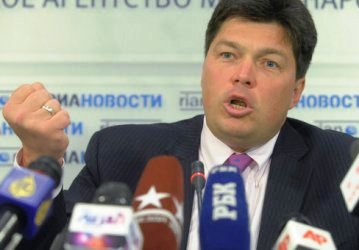Sudan ready to accept Abyei’s partition – Russian envoy
October 6, 2012 (KHARTOUM) – Sudan is ready to accept Abyei’s partition, to end the dispute over this region with South Sudan, said Mikhail Margelov, Russian President Vladimir Putin’s special envoy for cooperation with African countries.

In statements to the Russian news agency, RIA Novosti, about his visit to Sudan, Putin’s envoy said that Bashir informed him about the details of the deals he reached with his South Sudanese counterpart Salva Kiir on some disputed issues and joint cooperation on 27 September in Addis Ababa.
Margelov, according to a report of Novosti released in Arabic, further said that he discussed the issue of the disputed area of Abyei with Bashir. He quote the Sudanese president as saying that he agrees to split Abyei between Dinka Ngok and Misseriya.
Khartoum and Juba have said they are committed to hold a referendum in Abyei where its residents can decide to remain part of Sudan or to join the newly independent state in South Sudan. However, the two parties disagree over the participation of Misseriya nomad who resident partly in the area every year.
Bashir last September rejected a proposal made by the African chief mediator Thabo Mbeki to hold a referendum in Abyei in October 2013 where only the Misseriya who reside permanently can participate.
The Sudanese president accused the mediation of backing the position of the South Sudanese government and pointed out that this position contradicts Abyei protocol which “does not provide for ‘permanent’ abode or residence as a condition for voting in the referendum.”
In his letter Bashir reiterated the position of his government over the dispute saying they adhere to a previous proposal the mediation made in November 2010 providing to divide Abyei by a presidential decree that maintains the northern part of Abyei in Sudan and transferring the southern part to South Sudan.
Mbeki is expected to report to the African Union Peace and Security Council (AUPSC) and to the UN Security Council (UNSC) about the 27 September deals and the remaining unresolved issues: Abyei and border demarcations with its disputed areas.
The US administration, according to different sources, is encouraging Mbeki to bring the issue of Abyei to the Security Council following the same procedure of Mile 14, another disputed area, the AUPSC and UNSC forced Sudan to accept as disputed area after long months of refusal.
US Ambassador to the UN, Susan Rice expressed last Thursday its support to the proposal of the African mediation saying Mbeki “has tabled a proposal that is consistent with the Abyei protocol and the findings of the Permanent Court of Arbitration. We think that’s a worthy and valid proposal and we hope it will remain the basis of the negotiating efforts going forward.”
She further underscored that the united position of the 15 member council over Resolution 2046 helped much to achieve the progress made by the Sudanese and South Sudanese parties in the process. She further vowed to remain united to settle the remaining issues.
ECONOMIC PARTNERSHIP WITH RUSSIA
Margelov, who speaks Arabic, said that Sudan is much interested to develop economic ties with Russia particularly in the field of mineral resources.
He said Soviet scientists in the 1970s compiled a detailed geological map of Sudan, and that the Sudanese officials are very much interested in accessing that information.
According to Novosti, Sudan’s mineral resources minister, Kamal Abdel Latif Abdel Rahim, told Margelov during talks that Sudan has chosen Russia as a strategic mining cooperation partner.
Sudanese presidential assistant Nafie Ali Nafie, during his announced visit to Moscow at the end of October, is expected to discuss ways to enhance economic cooperation with Sudan.
Russia seeks to forge strong ties with countries that reject American influence in Africa and Middle East.
China, which has economic interests in Sudan and South Sudan, keeps a low profile every time it comes to discussing the disputes between the two countries, and Beijing is no longer the solid ally who supported Khartoum during the years of Darfur crisis.
(ST)
